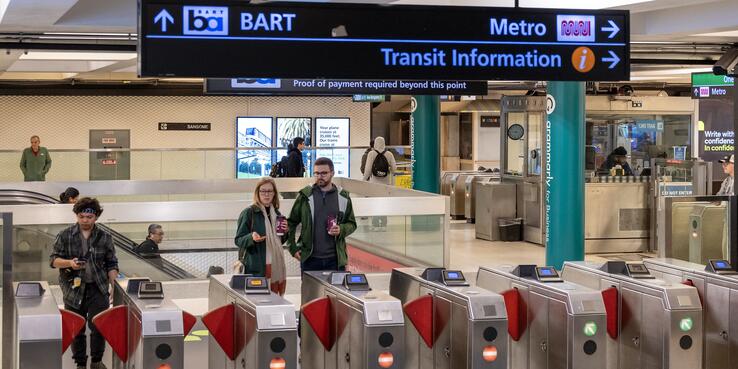A bill that would have authorized the Metropolitan Transportation Commission (MTC) to place a regional transportation revenue measure on the ballot in 2026 has been paused due to myriad concerns raised by elected officials and stakeholders. Consequently, service cuts could start early next year. SPUR supports a recently announced effort by MTC to identify a path to a new bill that would be introduced in the 2025 legislative session.
On May 31, senators Scott Wiener and Aisha Wahab, the bill’s authors, announced that they were pausing Senate Bill 1031. The move marks a troubling setback in ongoing efforts to identify options to address the looming fiscal challenges that confront many of the region’s largest and most heavily used transit systems. Last year, a SPUR-led coalition of advocacy groups and public organizations was able to successfully secure one-time state funding to temporarily avoid cuts to transit services. This funding extended the runway of financial viability for transit operators, but the “fiscal cliff” faced by Bay Area operators — including Muni, BART, Caltrain, AC Transit, Golden Gate Transit, and others — remains and grows closer by the day. Without a clear path to new regional funding, which SB 1031 was developed to address, cuts and other service impacts could begin as early as next year.
The Challenges of a Regional Measure
In February, SPUR published an article describing Senator Wiener and MTC’s efforts to advance enabling legislation for a regional transportation revenue measure, initially authored as SB 925. Subsequently, SB 925 was merged with SB 926, Senator Aisha Wahab’s bill calling for an exploration of transit agency consolidation within the Bay Area. The combined bill was then reintroduced in the legislature as SB 1031 on March 18.
Over the course of the spring, multiple challenges to SB 1031 emerged as the bill moved through the legislative process. The wide spectrum of concerns expressed by stakeholders included the bill’s proposed operator consolidation study, the makeup of the expenditure plan, the policy implications of different potential revenue sources and measure sizes, and the details of the bill’s proposed transportation demand management provisions. SPUR, along with many other transit advocates, public agencies, and stakeholders, ultimately chose to take a “support and seek amendments” position on the bill, signaling our support for the basic concept of a future revenue measure to support transit while also expressing our desire to see clearer accountability provisions for transit operators and policy guardrails that would limit the extent to which future funds could be spent for highway expansions.
The most significant concerns about SB 1031, however, related to the legislation’s potential fiscal impact and were raised by officials in Santa Clara, San Mateo, Marin, and Sonoma counties. First, a number of officials expressed a desire that the proposed expenditure plan framework achieve a higher level of “return to source,” or the proportion of revenues or benefits from a future measure that would be realized in specific counties relative to the amount of tax revenues those same counties would generate. Second, and perhaps most importantly, many transportation authorities and transit operators in the four counties already rely heavily on existing local sales-tax measures to fund their transit and transportation needs. Many of these measures (including measures that provide existing core funding to the Valley Transportation Authority in Santa Clara County, the San Mateo County Transportation Authority, and the Sonoma-Marin Rail Transit District) will require voter reauthorization over the coming years, setting up a potential conflict with the passage of the MTC-led sales tax measure that SB 1031 sought to authorize.
Although SB 1031 went through multiple rounds of amendments as it passed through policy committees in the legislature, those amendments did not address the fundamental issues raised by regional stakeholders and members of the legislature. At the May 22 MTC meeting, a majority of MTC commissioners expressed significant concerns related to the trajectory of the bill and called for a special meeting to consider the status of their ongoing sponsorship. On May 31, just days after it passed off of the senate floor, senators Wiener and Wahab announced that they would pause the bill.
What Happens Next?
Although SB 1031 will not advance, the underlying need for more transit funding remains. MTC held a special meeting on June 12, attended by Senator Wiener, that focused on the question of how to address the challenges and disagreements raised by SB 1031. While there was little discussion among commissioners at the meeting, MTC Chair Alfredo Pedroza announced the formation of a select committee tasked with building consensus and identifying a path to a new bill, which would be introduced as part of the 2025 legislative session. The committee will consist of both MTC commissioners and outside stakeholders, including SPUR.
SPUR has spent considerable effort over the last two years to advocate for adequate funding for transit operations, and we agree that it is essential to renew efforts to find regional consensus. We remain hopeful that legislation can address the fundamental operating needs of transit, bridge the diverse perspectives of Bay Area counties, and provide a compelling package for voters.
